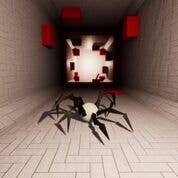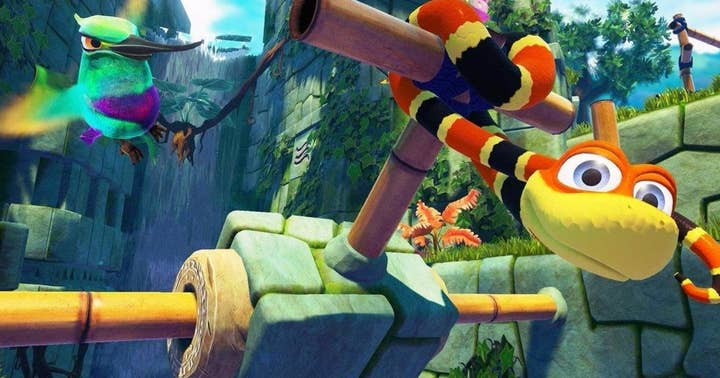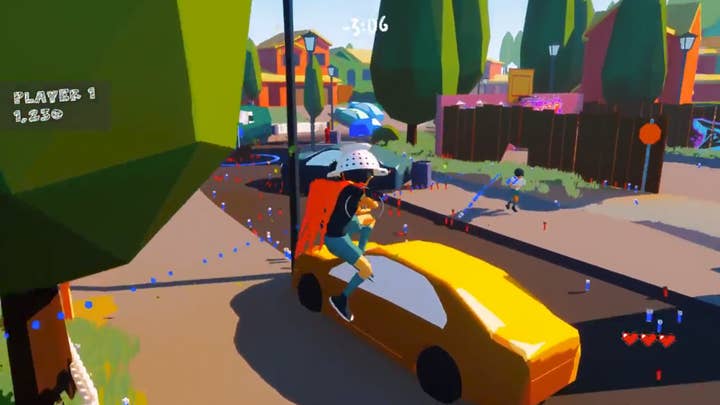Sumo's search for the next Snake Pass
Why the UK developer runs regular game jams - and is planning to share the playable prototypes for free
Internal game jams are nothing new. Studios around the world engage in this activity, ranging from AAA developers letting off steam to mobile developers desperately searching for their next hit. But very occasionally, they yield an idea that is eventually brought to the market.
Sumo Digital's Snake Pass is one such game. Born from a game jam prototype, the physics-based platforming game was taken to consumer shows like EGX Rezzed and quickly gained interest. Full production was greenlighted and within a year the game was released on various platforms - it was even released on Switch just a couple of weeks after launch, a feat the team worked hard to achieve.
Like so many indie games, Switch is the most successful platform and the studio is pleased with Snake Pass' combined sales of over 200,000 units across all devices. Most notably, it's given Sumo a taste for indie-style projects.

Since the original game jam in October 2015, Sumo Digital's main studio in Sheffield has since held six more, with a few in its other branches as well. But for managing director Paul Porter, there is more to these internal events than finding new product ideas.
"It's a fantastic opportunity for people to get together as a studio, meet people they wouldn't normally meet," he says. "Our AAA projects are kept separate but when we're having a game jam, people can come together with others in the organisation that they might know but not normally work with. It's about working with other people, coming up with new ideas, but also feeding off those ideas as well.
"It's a great opportunity for people to be as creative as they want to be, work with who they want to work with and potentially produce something that can ultimately come to market. But not every game jam is going to produce a Snake Pass. That's the tricky bit for us: at what point do we take a game jam idea and say, 'yes, we're going fund this and turn it into a prototype, something that we can commercialise'.
"The hardest decision is saying, 'actually, we're not quite sure there's anything there yet, and even though it's a great game jam game, it's not necessarily something we can see a market value in'. That's why we want to create a portal where those game jam games can be just played and enjoyed by the public."
"That's the tricky bit: at what point do we take an idea and say, yes, we're going fund this and turn it into something that we can commercialise"
This is a rare move: a studio sharing playable prototypes of its new game concepts, particularly for a developer as large as Sumo Digital. The primary function, of course, will be generating feedback that can be used to gauge interest in whether a concept deserves to be shifted into full production. While the details are still being finalised, the new online site where gamers will be able to download demos is likely to include fruits from the more recent jams.
On a recent visit to Sheffield, GamesIndustry.biz was able to see and even play some of these titles. Rascals was a fun multiplayer shooter where you play as kids running around a colourful neighbourhood wielding Nerf-style dart guns, collecting discarded darts to replenish your ammo. Legatus was a retro-style pixel shoot-'em-up that will appeal to gamers who enjoy a challenge. And The Eight Legged Project gave players control of a spider as it scurried through tight mazes, the perspective shifting as they seamlessly ran up walls and onto ceilings. And some of these prototypes are being developed further and may move into full production.
It's worth noting the game jam is not Sumo's only source of new project ideas. The firm has also formed a dedicated Concept Team, housed at the Sheffield studio. Staffed by just a handful of employees, this department constantly keeps track of what's happening in the industry and across the company and devices potential pitches to make to publishers, including ideas for third-party brands.

"We wanted to be creative come up with ideas for games and do a great job of responding to publishers when they want to know if we've got any good ideas on how to work with any IPs that they may own," Porter explains.
"We wanted to give a dedicated resource to that, rather than it be something that historically we've done when we're not busy on another project. Now we have this team who are very much focused on coming up with new ideas, looking at other people's IP and looking at what opportunities there might be when we finish whatever we're working on."
This plays into Sumo Digital's strength as a developer of AAA products, handling publisher-owned IP to create new blockbusters. It's the lead developer for Crackdown 3 and Dead Island 2, it's working on Team Sonic Racing as part of an ongoing partnership with Sega, and it's even contributing to Warner Bros' upcoming Hitman 2.
But while this will continue to form the backbone of Sumo Digital for years to come, Porter is intrigued to see how another Snake Pass-style product will perform.
"We'll definitely do more," he says. "We definitely have a bit of a pipeline going for our own creative ideas, whether that's from the game jam or from the new concept and prototyping teams we've set up. But we're not pivoting the business to do that instead. We're not spending a lot of money on that compared to the larger, funded development we do. So don't expect to see five, ten games a year coming out. Maybe one or two, though, at [Snake Pass'] kind of scale - absolutely."

Given the studio's capacity to create AAA products, ranging from racing games to platformers to open world action titles, is Sumo not even a little tempted to aim for something bigger?
"No," says Porter. "We're definitely looking at doing it on an indie scale because we're not pivoting the business into an IP-generating one. We're not taking that IP generation risk, we'll leave other people to do that. It's really a value add. We need to be careful about which opportunities we do take to market ourselves and retain the IP."
"We definitely have a pipeline going for our own creative ideas... So don't expect to see five, ten games a year coming out. Maybe one or two"
He adds that some of the ideas the Sumo team comes up with during its game jams, or via the concept team, may well become AAA products - but this would mostly likely be through a third-party brand rather than original IP, perhaps as something pitched to publishers by the concept team.
"It may be that something we have turns into a much bigger opportunity, and it may be that we're not the ones who retain the IP because we're not the ones funding it and they'll potentially end up owning the IP," he says.
The creation of the concept team, and the ongoing ability to hold game jams, is helped in part by the completion of Sumo's £145 million IPO just before Christmas. This establishes The Sumo Group, which encompasses both Sumo Digital and last year's acquisition Atomhawk, as a publicly listed company and has boosted the firm's development studios across the UK.
We've previously spoken to Sumo Group CEO Carl Cavers about this milestone for the company. From a Sumo Digital perspective, Porter tells us the move was about "setting up the company to be in its final form" so the team can "worry less about who owns the company, and focus more on the games we're making."
"If we run two or three game jams per year, everyone should be able to get involved in at least one of them"
"It's absolutely enabled us to look more to the future and the things we want to do," he says. "Certainly, the renovations of the studio have been a great boon for the team. We did start working on some of our own IP stuff with Snake Pass and doing the game jams when Ian Livingstone came on board a few years ago. But the IPO enables us to not just continue doing that, but to invest in our own ideas in a very managed way if need be."
The success of both the IPO and Snake Pass has even encouraged Sumo Digital to expand the remit of its other studios. Most notably, the firm's branch in Pune, India was originally dedicated to art but has more recently added more engineering capacity.
"Quite a lot of the tech behind Snake Pass was done in India, which proved the engineering chops out there," Porter explains. "Just recently set up a small design pod there, so we've currently got some designers doing some training and we're getting some good results from that initiative."

Sumo Digital plans to continue hosting internal game jams two or three times per year - a higher number than other studios, which often make such an event an annual occurrence. Porter explains the nature of Sumo's multi-project model means multiple game jams are something of a necessity if the firm really wants to reap the benefits.
"Ultimately, when we run a game jam, we often have a project or two that is coming up to a milestone deadline or that's near completion and that team is probably too busy or committed to be involved," he says. "So even though we run it as a studio-wide event, it might be that half the studio can't actually join in. Hopefully, if we run two or three game jams over the course of the year, everyone should be able to get involved in at least one of them."
"Being creative in games is often about constraints... But a game jam means they can work on what they like"
He goes on to say it also serves as a bit of a palate cleanser for its developers. The nature of AAA development means projects can last years - Crackdown 3, for example, has been in development since 2014 - and individuals on the team are often restricted to a single discipline.
"That's one of the main benefits of the game jam, for people to be able to switch gears for a little bit of time," says Porter. "Being creative in games is often about constraints and a lot of the time we're working on large projects where individuals have to work within a lot of constraints because they're part of a large organised team, they're having to work together in a certain way.
"But a game jam means they can work on what they like. It's a bit of a refresher and ultimately everyone's got a game that they want to make and think is good enough to be published - I've got one, so one of these times I'll join in."
Finally, Porter says internal game jams have also been instrumental in identifying talent the management weren't fully aware of. Sumo's Sheffield studio has over 300 employees, with another 80-plus over in Nottingham, making it impossible to know where each individual's talents truly lie - especially among graduates and new recruits.
"Sometimes you don't realise how much creativity can be within someone new to the industry and to the business," Porter concludes. "The things they can do when they collaborate with a couple of people around them in a very short order is very surprising, and it's impressive. That talent percolates to the top."




.jpg?width=291&height=164&fit=crop&quality=80&format=jpg&auto=webp)



